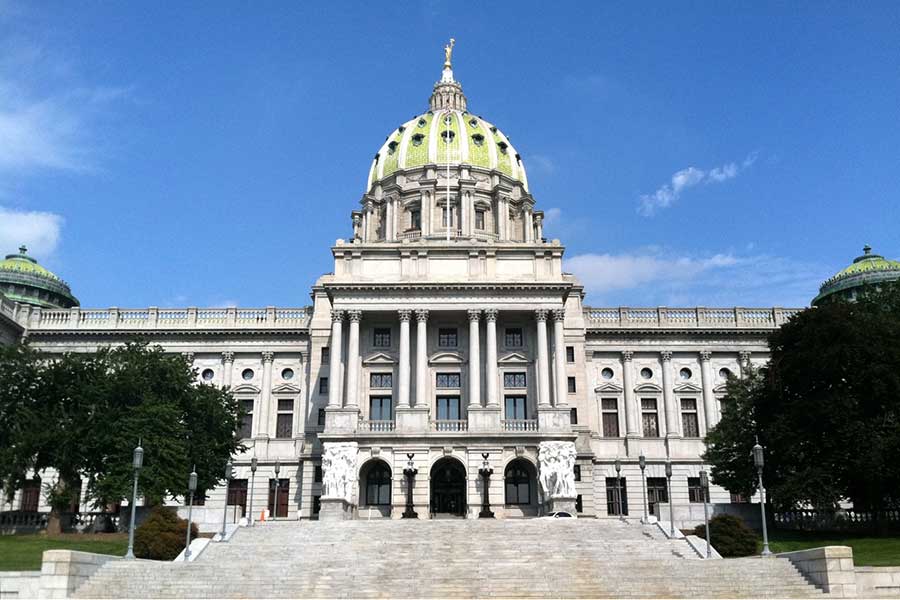Whether to include a religious exemption in a proposed bill to prohibit LGBT discrimination in employment dominated the conversation in a four-hour public hearing Aug. 30 in Harrisburg.
The state Senate Labor and Industry Committee invited 19 people – including religious leaders, human-relations officials, labor leaders and lobbyists – to offer input. More than 700 Pennsylvanians also submitted written comments to the committee.
Full testimony is available at www.senatorbaker.com. Sen. Lisa Baker, a Luzerne County Republican, chairs the Labor and Industry Committee. The committee is not expected to schedule a vote until after Labor Day, at the earliest, when the legislature returns to session.
Religious concerns
Katherine Franke, a professor of religious law at Columbia Law School, said the bill, SB 1306, “strikes the right balance between equality and religious liberty.”
She said four layers of protection for religious liberty already exist without adding language to the employment-nondiscrimination bill. Those are the First Amendment, Article 1 Section 3 of the Pennsylvania Constitution, the 2002 Religious Freedom Protection Act in Pennsylvania and a religious exemption contained in the Pennsylvania Human Relations Act.
Franke called the existing religious protections in Pennsylvania “ample, if not generous,” and said any further expansion risks “the unlawful fostering of religion.”
Tim Schultz, director of the 1st Amendment Partnership in Washington, D.C., said religious institutions are looking for protection from “ruinous litigation.”
“There’s a possibility you will lose and shut down,” he said, noting religious charities, shelters, hospitals and adoption agencies are cornerstones in their communities.
Dr. Robert J. O’Hara Jr., executive director of the Pennsylvania Catholic Conference, argued for an exemption that would allow religious institutions to have discretion in every employment decision, from a ministry position to the janitor.
“The janitor could have a closer relationship to a student than a teacher sometimes,” O’Hara said. “Parents send their children to our schools to live and learn our religion. If [employees] model behavior that could be detrimental to the children, that could be a concern.”
He also wished there could be a policy distinction between a person’s orientation and behavior. He said the church would not refuse to hire a gay person “living a chaste life.”
Sen. Daylin Leach, a Montgomery County Democrat, called that proposition “very unreasonable and even cruel,” before asking the religious advocates if they would support the bill if it only applied to secular institutions and completely exempted religious ones.
After a pause, Philip J. Murren, an attorney for the Pennsylvania Catholic Conference, said further discussion would be useful.
“My answer is a qualified yes,” Schultz said.
Labor concerns
Some concerns from the labor community also arose, despite strong support from the health-care industry.
Pennsylvania’s biggest non-government employer with 60,000 employees – the University of Pittsburgh Medical Center – and SEIU Healthcare, the union that represents more than 45,000 health workers in the state, both spoke in support of employment-nondiscrimination protections for the LGBT community. Representatives said the law would help them recruit and retain the best talent, especially during national searches for top positions.
Still, Alex Halper, director of government affairs for the Pennsylvania Chamber of Business And Industry, noted difficulties for employers in working through claims of discrimination. He said the average case with the Pennsylvania Human Relations Commission takes over a year — 487 days — to be resolved, and 63 percent of cases are closed because the commission has found no probable cause for discrimination.
“We really need the legislators to work with us to get us a sustainable budget,” said JoAnn Edwards, executive director of the Pennsylvania Human Relations Commission. Years ago, more than 100 people worked at the commission. Since a 2015 budget cut, Edwards said she has been on a hiring freeze with 70 employees. She recently received the authority to hire up to 84.
Edwards anticipated at least 100 LGBT employment-discrimination complaints in the first year with the new law. She said she would ask the state for $581,352 to train workers to adjudicate claims, upgrade the computer system and run a media campaign about the LGBT employment-nondiscrimination law, should it pass.
Stephen Glassman, a former chair of the Pennsylvania Human Relations Commission, called attention to the piecemeal efforts to protect the LGBT community.
“Never before in the history of the commission,” he said, “which is 1955 until now, almost 70 years, have we separated out protections on the basis of employment, public accommodations and housing from any class that was added to the Pennsylvania Human Relations Act. To make us go through the extra effort of having three separate bills passed, I think is an important point to note.”
The State Government Committee will hold a public hearing Sept. 26 to get comments on a public-accommodations nondiscrimination bill. It will also discuss the Pennsylvania Fairness Act, which would extend LGBT-protections in employment, housing and public accommodations. A housing-nondiscrimination bill made it out of the Housing and Urban Affairs Committee in June.

